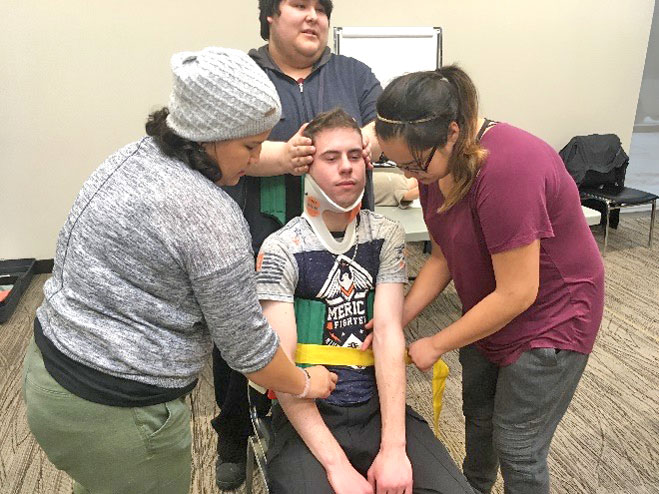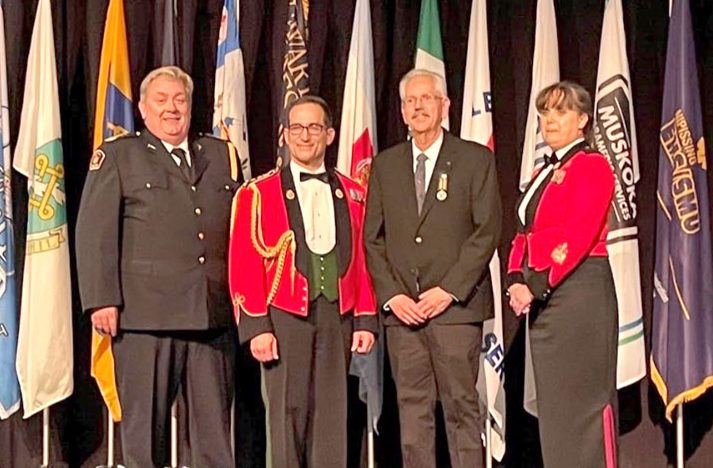KENORA – A former Wellington County resident was recently recognized for a remarkable career in emergency medical service, much of it spent providing first response training in Indigenous communities in Ontario’s far north.
In the fall Arthur native Mark Cudney was presented with the Governor General’s Emergency Medical Service Exemplary Service Medal during the Ontario Association of Paramedic Chiefs (OAPC) fall symposium in Niagara Falls.
Cudney’s entire career has had a training focus.
“My dad was the fire chief in Arthur, Ontario and there was a need for CPR training so I took the training and started teaching it,” he recalls.
Raised in Arthur, Cudney became a paramedic and began his career working in this area.
An ordained minister, he also spent time providing counselling as a chaplain in Palmerston.
In 2017 Cudney moved to northern Ontario to take a position teaching emergency first response to First Nation communities.
After a brief secondment to manage the 911 call centre for the region, he returned to his original position in a program that was eventually expanded to cover the entire province.
Fast forward to today, Cudney has 45 years of caring for people as a paramedic, teaching pre-hospital medical care and working as a chaplain and missionary under his belt.
As the coordinator of the Regional Training Program with Lake of the Woods District Hospital (LWDH) in Kenora, Cudney plans, coordinates and evaluates the delivery of emergency first response training courses in First Nations communities throughout Ontario.
This position taps the skill sets Cudney developed working as a paramedic and chaplain missionary together.
His job is to oversee and train volunteer first response teams. In many communities the training provides an important link for consistent medical care.
The training consists of completing a minimum of 40 hours of intense training, some of which Cudney was involved in creating.
He is a registered psychotherapist and used this knowledge, combined with his experience, to write a mental health component to the training, titled Compassion Fatigue.
“When you do this line of work it will take a toll on a person,” he said.
“It is really important to understand that and consider ways of prioritizing your own wellness.”
In addition to program set up and volunteer training, the Regional Training Program (funded by the Province of Ontario) also supplies First Nation communities with about $20,000 worth of patient care equipment (defibrillators, specialized splints, oxygen equipment, stretchers, etc.) at no cost.
The program is unique to Ontario and has been in existence for about 25 years.
“LWDH is making a difference with the program throughout the Province of Ontario” said Cudney.
In addition to Cudney, there are three full-time regional instructors and three contract instructors working in the program.
“I couldn’t even begin to count how many volunteers have been trained over the years,” he noted.
Much of the work of Cudney and other regional instructors involves going into remote communities and training community volunteers in emergency first response.
Most of the volunteers have no prior training in first response and are learning “from scratch,” he notes.
Without the program, most of the remote communities would have no residents with the training to respond in an emergency.
“Some of our communities have no road access … and the only way you can get there is by air, or in late January, February, the ice roads,” Cudney told the Advertiser in a telephone interview.

As coordinator of the Regional Training Program with Lake of the Woods District Hospital in Kenora, Arthur native Mark Cudney organizes training sessions like this extraction skills session in Wabigoon First Nation. Submitted photo
First response is particularly important, Cudney points out, as remote communities must deal with the same type of emergencies as more urban areas, with far fewer resources.
“You have the same level of … medical and trauma calls, heart attack, strokes, falls, all that kind of stuff,” he notes.
“This far north in a lot of these First Nation communities there is no doctor,” he explained.
“So if they get a critical patient in there, they’re on the phone and telemedicine to Thunder Bay or wherever to get the direction from the medical doctors.”
Through the program, teams of 12 to 15 people are trained in 34 communities, which mostly range in size from 300 to about 1,500 in population.
His work on the program, as well as the dedication, passion and leadership he demonstrated over the past 45 years, are the reasons Cudney was awarded the Governor General’s medal, which was presented at the OAPC Fall Symposium in Niagara Falls on Oct. 6.
The award was presented by Colonel Jean-Pierre Picard, second in command of the health services section of the Canadian Armed Forces.
The accolade recognizes professionals in the provision of pre-hospital emergency medical services to the public, who have performed their duties in an exemplary manner, characterized by good conduct, industry and efficiency.
Award recipients must have been employed with emergency medical services and have completed 20 years of exemplary service, including at least 10 years in the performance of duties involving potential risk.
“We have so many dedicated paramedics in Ontario and the OAPC is proud to present these medals every year,” stated OAPC president Chief Michael Sanderson in a press release issued at the time of the presentation.
“These … professionals have shown up every day for over a decade putting the care for their communities first. It’s an honour to recognize them.”
The Emergency Medical Services Exemplary Service Medal was created in 1994 by the late Governor General Romeo LeBlanc, as a component of the Canadian Honours System.
Since the award’s inception, there have been approximately 2,100 Ontario recipients of the medal.
Reflecting on the evening, Cudney shared, “It was a spectacular night shared with my family. My first thought that comes to mind when I look back is – Wow, how have 45 years gone by this quickly?
“I couldn’t have done any of this without the help and support of so many people in my life, especially my children.”
He added, “I have a truly supportive staff and I’m very, very honoured to receive this award and medal.
“Somebody saw my career and … said, ‘Maybe you should be recognized for everything you’ve done as a paramedic, missionary, chaplain, and now this job.’
“So it’s quite humbling.”




